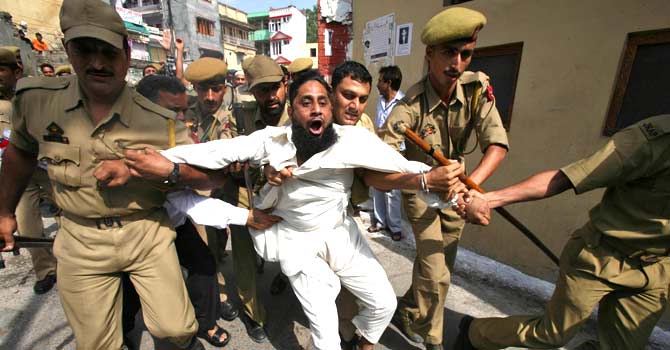
SRINAGAR: India and its courts have prevented fair investigations and prosecutions of security officials accused of human rights violations in Kashmir, ignoring its own laws in the restive Himalayan region, two rights groups said on Thursday.
The report by two local groups names, for the first time, specific paramilitary soldiers and police suspected of crimes, which include rape, murder and kidnapping.
Despite the evidence contained in government documents, India has not shown “any institutional or political will” to prosecute those responsible, the groups said.
The government would not comment. “We will have first to go through the contents of the report and then we will respond,” Ali Mohammed Sagar, the law minister of Indian-held Kashmir, told The Associated Press.
The report dismissed India’s past claims that acts of brutality by security personnel were aberrations.
“Volumes of evidence exist of crimes committed by specific perpetrators, assisted by a system where impunity is available right from the commission of the crime to the ultimate cover-up,” the report said.
Under emergency laws in Kashmir, government forces can shoot suspects on sight and federal approval is needed for local authorities to prosecute any soldier posted in Kashmir.
Not a single approval has been granted since India began facing a bloody, armed rebellion for the region’s independence or merger with Pakistan in 1989. The uprising and subsequent Indian crackdown have killed 68,000 people.
In recent years, the armed conflict has largely subsided, with public opposition to Indian rule now seen mostly in street protests, where government forces and rock throwing youths regularly face off.
Nevertheless, emergency laws remain in force, and hundreds of thousands of Indian soldiers are stationed in the region, maintaining checkpoints throughout Indian-controlled territory.
Pakistan and China also control portions of Kashmir.
The report examined 124 killings, 65 disappearances, 59 cases of torture and nine rapes allegedly committed by government forces from 1990 to 2011.
It said the Indian judiciary has effectively condoned human rights violations, sometimes by offering compensation to close complaints and sometimes by not pursuing cases due to the emergency laws in place in Kashmir. It called monetary compensation at best a “weak palliative measure, and at worst a bribe to buy the silence of the victims.”
The report was compiled by the Association of Parents of Disappeared Persons and the International People’s Tribunal on Human Rights and Justice in Indian-administered Kashmir, or IPTK. They based it mostly on government documents and information acquired through dozens of demands under India’s Right to Information laws.
Kartik Murukutla, a human rights lawyer and one of the authors of the report, said India’s top priority in Kashmir has been keeping control over the territory – not pursuing justice.
“Our study shows that, first, police investigations into most of the cases have been conducted in farcical ways to shield the perpetrators,” said Murukutla.
“Then lower courts as well as (India’s) apex court have remained subservient to the state and played part in the larger cover-up.”
The 469 individual suspects named in the report include two army major generals, three brigadiers, a recently retired director general of police and a serving inspector general.
The accusations include: an army major, two senior police officers and four policemen jointly blamed for killing 19 members of three families, including eight children, in 1998; an army captain and a police officer accused of raping a mother and her daughter in 2000; and two army officers blamed for torturing to death three people in custody in 2000.
The groups justified naming the officials as a way to remove “the veil of anonymity and secrecy that has sustained impunity” in Kashmir.
“Only when the specificity of each act of violation is uncovered can institutions be stopped from providing the violators a cover of impunity,” the report said.









































